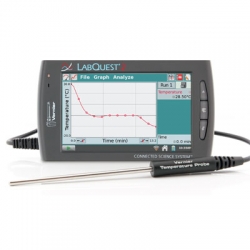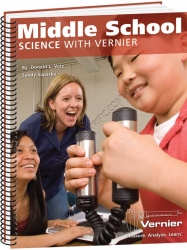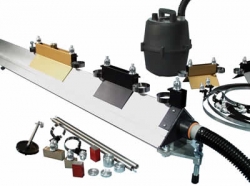10 low relevance results shown for 'Energy'.
Showing low relevance matches only. Return to normal search results
Electrical Circuits - Electrical energy can be transferred and transformed in electrical circuits and can be generated from a range of sources ACSSU155 Year 8 Physical Sciences
Energy Forms - Energy appears in different forms, including movement (kinetic energy), heat and potential energy, and energy transformations and transfers cause change within systems ACSSU176 Year 9 Biological Sciences
Ecology - Ecosystems consist of communities of interdependent organisms and abiotic components of the environment; matter and energy flow through these systems ACSSU179 Year 9 Chemical Sciences
Chemical Reactions - Chemical reactions, including combustion and the reactions of acids, are important in both non-living and living systems and involve energy transfer ACSSU182 Year 9 Physical Sciences
Energy Transfer - Energy transfer through different mediums can be explained using wave and particle models ACSSU190 Year 10 Physical Sciences
Energy Conservation - Energy conservation in a system can be explained by describing energy transfers and transformations ACSSU219 Year 6 Physical Sciences
Alternative Energies - Energy from a variety of sources can be used to generate electricity ACSCH018 Year 11 Chemical fundamentals
Properties and structure of atoms - Atoms can be modelled as a nucleus surrounded by electrons in distinct energy levels, held together by electrostatic forces of attraction between the nucleus and electrons; atoms can be represented using electron shell diagrams (all electron shells or val ACSCH019 Year 11 Chemical fundamentals
Properties and structure of atoms - Flame tests and atomic absorption spectroscopy are analytical techniques that can be used to identify elements; these methods rely on electron transfer between atomic energy levels ACSCH036 Year 11 Chemical fundamentals
Chemical reactions - All chemical reactions involve the creation of new substances and associated energy transformations, commonly observable as changes in the temperature of the surroundings and/or the emission of light ACSCH037 Year 11 Chemical fundamentals
Chemical reactions - Endothermic and exothermic reactions can be explained in terms of the Law of Conservation of Energy and the breaking and reforming of bonds; heat energy released or absorbed can be represented in thermochemical equations ACSCH073 Year 11 Molecular interactions and reactions
Rates of chemical reactions - Catalysts, including enzymes and metal nanoparticles, affect the rate of certain reactions by providing an alternative reaction pathway with a reduced activation energy, hence increasing the proportion of collisions that lead to a chemical change ACSPH020 Year 11 Thermal nuclear and electrical physics
Heating processes - Provided a substance does not change state, its temperature change is proportional to the amount of energy added to or removed from the substance; the constant of proportionality describes the heat capacity of the substance ACSPH022 Year 11 Thermal nuclear and electrical physics
Heating processes - Two systems in contact transfer energy between particles so that eventually the systems reach the same temperature; that is, they are in thermal equilibrium ACSPH030 Year 11 Thermal nuclear and electrical physics
Ionising radiation and nuclear reactions - Alpha, beta and gamma radiation have sufficient energy to ionise atoms ACSPH039 Year 11 Thermal nuclear and electrical physics
Electrical circuits - Energy is conserved in the energy transfers and transformations that occur in an electrical circuit ACSPH040 Year 11 Thermal nuclear and electrical physics
Electrical circuits - The energy available to charges moving in an electrical circuit is measured using electric potential difference, which is defined as the change in potential energy per unit charge between two defined points in the circuit ACSPH041 Year 11 Thermal nuclear and electrical physics
Electrical circuits - Energy is required to separate positive and negative charge carriers; charge separation produces an electrical potential difference that can be used to drive current in circuits ACSPH042 Year 11 Thermal nuclear and electrical physics
Electrical circuits - Power is the rate at which energy is transformed by a circuit component; power enables quantitative analysis of energy transformations in the circuit ACSPH065 Year 11 Linear Motion and Waves
Linear motion and force - Energy is conserved in isolated systems and is transferred from one object to another when a force is applied over a distance; this causes work to be done and changes to kinetic and/or potential energy of objects ACSPH066 Year 11 Linear Motion and Waves
Linear motion and force - Collisions may be elastic and inelastic; kinetic energy is conserved in elastic collisions ACSPH073 Year 11 Linear Motion and Waves
Waves - A mechanical system resonates when it is driven at one of its natural frequencies of oscillation; energy is transferred efficiently into systems under these conditions ACSPH111 Year 12 Gravity and electromagnetism
Electromagnetism - Conservation of energy, expressed as Lenz’s Law of electromagnetic induction, is used to determine the direction of induced current ACSPH136 Year 12 Revolutions in modern physics
Quantum theory - On the atomic level, electromagnetic radiation is emitted or absorbed in discrete packets called photons; the energy of a photon is proportional to its frequency; and the constant of proportionality, Planck’s constant, can be determined experimentally (fo ACSPH139 Year 12 Revolutions in modern physics
Quantum theory - The Bohr model of the hydrogen atom integrates light quanta and atomic energy states to explain the specific wavelengths in the hydrogen spectrum and in the spectra of other simple atoms; the Bohr model enables line spectra to be correlated with atomic en ACSBL052 Year 11 Biodiversity and the interconnectedness of life
Ecosystem dynamics - Photosynthesis is a biochemical process that in plant cells occurs in the chloroplast and that uses light energy to organic compounds; the overall process can be represented as a balanced chemical equation ACSBL053 Year 11 Biodiversity and the interconnectedness of life
Ecosystem dynamics - Cellular respiration is a biochemical process that occurs in different locations in the cytosol and mitochondria and metabolises organic compounds, aerobically or anaerobically, to release useable energy in the form of ATP; the overall process can be repr ACSPH021 Year 11 Thermal nuclear and electrical physics
Heating processes - Change of state involves internal energy changes to form or break bonds between atoms or molecules; latent heat is the energy required to be added to or removed from a system to change the state of the system ACSPH067 Year 11 Linear Motion and Waves
Waves - Waves are periodic oscillations that transfer energy from one point to another ACSPH070 Year 11 Linear Motion and Waves
Waves - Mechanical waves transfer energy through a medium; mechanical waves may oscillate the medium or oscillate the pressure within the medium ACSPH140 Year 12 Revolutions in modern physics
Quantum theory - On the atomic level, energy and matter exhibit the characteristics of both waves and particles ACSPH135 Year 12 Revolutions in modern physics
Quantum theory - Atomic phenomena and the interaction of light with matter indicate that states of matter and energy are quantised into discrete values ACSPH105 Year 12 Gravity and electromagnetism
Electromagnetism - When a charged body moves or is moved from one point to another in an electric field and its potential energy changes, work is done on or by the field










10 low relevance results shown for 'Energy'.
Showing low relevance matches only. Return to normal search results
Curriculum resources related to 'Energy'
ACSSU097 Year 6 Physical SciencesElectrical Circuits - Electrical energy can be transferred and transformed in electrical circuits and can be generated from a range of sources ACSSU155 Year 8 Physical Sciences
Energy Forms - Energy appears in different forms, including movement (kinetic energy), heat and potential energy, and energy transformations and transfers cause change within systems ACSSU176 Year 9 Biological Sciences
Ecology - Ecosystems consist of communities of interdependent organisms and abiotic components of the environment; matter and energy flow through these systems ACSSU179 Year 9 Chemical Sciences
Chemical Reactions - Chemical reactions, including combustion and the reactions of acids, are important in both non-living and living systems and involve energy transfer ACSSU182 Year 9 Physical Sciences
Energy Transfer - Energy transfer through different mediums can be explained using wave and particle models ACSSU190 Year 10 Physical Sciences
Energy Conservation - Energy conservation in a system can be explained by describing energy transfers and transformations ACSSU219 Year 6 Physical Sciences
Alternative Energies - Energy from a variety of sources can be used to generate electricity ACSCH018 Year 11 Chemical fundamentals
Properties and structure of atoms - Atoms can be modelled as a nucleus surrounded by electrons in distinct energy levels, held together by electrostatic forces of attraction between the nucleus and electrons; atoms can be represented using electron shell diagrams (all electron shells or val ACSCH019 Year 11 Chemical fundamentals
Properties and structure of atoms - Flame tests and atomic absorption spectroscopy are analytical techniques that can be used to identify elements; these methods rely on electron transfer between atomic energy levels ACSCH036 Year 11 Chemical fundamentals
Chemical reactions - All chemical reactions involve the creation of new substances and associated energy transformations, commonly observable as changes in the temperature of the surroundings and/or the emission of light ACSCH037 Year 11 Chemical fundamentals
Chemical reactions - Endothermic and exothermic reactions can be explained in terms of the Law of Conservation of Energy and the breaking and reforming of bonds; heat energy released or absorbed can be represented in thermochemical equations ACSCH073 Year 11 Molecular interactions and reactions
Rates of chemical reactions - Catalysts, including enzymes and metal nanoparticles, affect the rate of certain reactions by providing an alternative reaction pathway with a reduced activation energy, hence increasing the proportion of collisions that lead to a chemical change ACSPH020 Year 11 Thermal nuclear and electrical physics
Heating processes - Provided a substance does not change state, its temperature change is proportional to the amount of energy added to or removed from the substance; the constant of proportionality describes the heat capacity of the substance ACSPH022 Year 11 Thermal nuclear and electrical physics
Heating processes - Two systems in contact transfer energy between particles so that eventually the systems reach the same temperature; that is, they are in thermal equilibrium ACSPH030 Year 11 Thermal nuclear and electrical physics
Ionising radiation and nuclear reactions - Alpha, beta and gamma radiation have sufficient energy to ionise atoms ACSPH039 Year 11 Thermal nuclear and electrical physics
Electrical circuits - Energy is conserved in the energy transfers and transformations that occur in an electrical circuit ACSPH040 Year 11 Thermal nuclear and electrical physics
Electrical circuits - The energy available to charges moving in an electrical circuit is measured using electric potential difference, which is defined as the change in potential energy per unit charge between two defined points in the circuit ACSPH041 Year 11 Thermal nuclear and electrical physics
Electrical circuits - Energy is required to separate positive and negative charge carriers; charge separation produces an electrical potential difference that can be used to drive current in circuits ACSPH042 Year 11 Thermal nuclear and electrical physics
Electrical circuits - Power is the rate at which energy is transformed by a circuit component; power enables quantitative analysis of energy transformations in the circuit ACSPH065 Year 11 Linear Motion and Waves
Linear motion and force - Energy is conserved in isolated systems and is transferred from one object to another when a force is applied over a distance; this causes work to be done and changes to kinetic and/or potential energy of objects ACSPH066 Year 11 Linear Motion and Waves
Linear motion and force - Collisions may be elastic and inelastic; kinetic energy is conserved in elastic collisions ACSPH073 Year 11 Linear Motion and Waves
Waves - A mechanical system resonates when it is driven at one of its natural frequencies of oscillation; energy is transferred efficiently into systems under these conditions ACSPH111 Year 12 Gravity and electromagnetism
Electromagnetism - Conservation of energy, expressed as Lenz’s Law of electromagnetic induction, is used to determine the direction of induced current ACSPH136 Year 12 Revolutions in modern physics
Quantum theory - On the atomic level, electromagnetic radiation is emitted or absorbed in discrete packets called photons; the energy of a photon is proportional to its frequency; and the constant of proportionality, Planck’s constant, can be determined experimentally (fo ACSPH139 Year 12 Revolutions in modern physics
Quantum theory - The Bohr model of the hydrogen atom integrates light quanta and atomic energy states to explain the specific wavelengths in the hydrogen spectrum and in the spectra of other simple atoms; the Bohr model enables line spectra to be correlated with atomic en ACSBL052 Year 11 Biodiversity and the interconnectedness of life
Ecosystem dynamics - Photosynthesis is a biochemical process that in plant cells occurs in the chloroplast and that uses light energy to organic compounds; the overall process can be represented as a balanced chemical equation ACSBL053 Year 11 Biodiversity and the interconnectedness of life
Ecosystem dynamics - Cellular respiration is a biochemical process that occurs in different locations in the cytosol and mitochondria and metabolises organic compounds, aerobically or anaerobically, to release useable energy in the form of ATP; the overall process can be repr ACSPH021 Year 11 Thermal nuclear and electrical physics
Heating processes - Change of state involves internal energy changes to form or break bonds between atoms or molecules; latent heat is the energy required to be added to or removed from a system to change the state of the system ACSPH067 Year 11 Linear Motion and Waves
Waves - Waves are periodic oscillations that transfer energy from one point to another ACSPH070 Year 11 Linear Motion and Waves
Waves - Mechanical waves transfer energy through a medium; mechanical waves may oscillate the medium or oscillate the pressure within the medium ACSPH140 Year 12 Revolutions in modern physics
Quantum theory - On the atomic level, energy and matter exhibit the characteristics of both waves and particles ACSPH135 Year 12 Revolutions in modern physics
Quantum theory - Atomic phenomena and the interaction of light with matter indicate that states of matter and energy are quantised into discrete values ACSPH105 Year 12 Gravity and electromagnetism
Electromagnetism - When a charged body moves or is moved from one point to another in an electric field and its potential energy changes, work is done on or by the field
Products related to 'Energy'

Vernier LabQuest 2 Data Logger and Interface
No longer available replaced by LabQuest 3
Vernier's popular LabQuest 2 is now discontinued as it has been superseded by the LABQ3 Vernier LabQuest 3 a powerful, advanced, easy-to-navigate and versatile datalogging solution for STEM students. The Vernier LabQues... Order code: LABQ2
Vernier's popular LabQuest 2 is now discontinued as it has been superseded by the LABQ3 Vernier LabQuest 3 a powerful, advanced, easy-to-navigate and versatile datalogging solution for STEM students. The Vernier LabQues... Order code: LABQ2

Vernier Logger Pro 3 Data Logging Software
Logger Pro will be discontinued in December 2024, replaced by Graphical Analysis Pro, Vernier Video Analysis, Vernier Instrumental Analysis and Vernier Spectral Analysis.
VERNIER LOGGER PRO 3
Vernier's Logger Pro is an easy to use data-collection and analysis software for Windows and Mac computers. The generous Site Licence covers a single school campus or in the case of a university, a single department at a single campus. The licence in...
Order code: LP

Vernier Logger Pro 3 Software Electronic Version
VERNIER LOGGER PRO 3 DOWNLOAD
Vernier's Logger Pro is an easy to use data-collection and analysis software for Windows and Mac computers. The generous Site Licence covers a single school campus or in the case of a university, a single department at a single campus. The l...
Order code: LP-E

Vernier Dynamics Cart and Track System
VERNIER DYNAMICS CART AND TRACK SYSTEM
The Dynamics Cart and Track System provides students with the tools they need to explore kinematics, dynamics, momentum and energy. This versatile system can also be easily adapted to study optics, colour and diffraction.
The Vern...
Order code: DTS

Vernier Dynamics Track System Long
VERNIER DYNAMICS TRACK SYSTEM LONG
The Dynamics Cart and Track System provides students with the tools they need to explore kinematics, dynamics, momentum and energy. This versatile system can also be easily adapted to study optics, colour and diffraction.
The Vernier ...
Order code: DTS-LONG

Vernier Go Direct Sensor Cart Accessory Kit
VERNIER GO DIRECT SENSOR CART ACCESSORY KIT
The Vernier Go Direct Sensor Cart Accessory Kit includes springs, magnets, masses and replacement parts for the Vernier Go Direct Sensor Cart. The kit makes multiple-collision experiments possible, supporting impulse and momentu...
Order code: GDX-CART-AK

Middle School Science with Vernier
MIDDLE SCHOOL SCIENCE WITH VERNIER
Middle School Science with Vernier was written specifically for students in grades 6-8. It is a lab book containing 38 experiments in earth science, life science and physical science, making use of ten different Vernier middle school sen...
Order code: MSV

Middle School Science with Vernier - Electronic Version
MIDDLE SCHOOL SCIENCE WITH VERNIER
Middle School Science with Vernier was written specifically for students in grades 6-8. It is a lab book containing 38 experiments in earth science, life science and physical science, making use of ten different Vernier middle school sen...
Order code: MSV-E

IEC Air Track 2.0m Complete with All Parts
IEC AIR TRACK 2m COMPLETE
The IEC Linear Air Track provides an almost friction free system on which a large range of mechanics experiments may be performed. A long straight 90° triangular shaped tube is mounted on three adjustable levelling feet. An air blower pumps air ...
Order code: MF0107Z-001

IEC Air Track 2.5m Complete with All Parts
IEC AIR TRACK 2.5m COMPLETE
The IEC Linear Air Track provides an almost friction free system on which a large range of mechanics experiments may be performed. A long straight 90° triangular shaped tube is mounted on three adjustable levelling feet. An air blower pumps ai...
Order code: MF0105Z-001
10 low relevance results shown for 'Energy'.



 ,
,